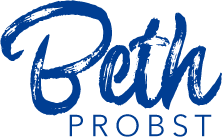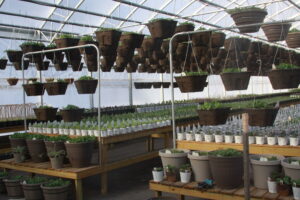Northwoods cabins are not uncommon in northern Wisconsin. A popular second home destination to many families looking for a respite from the city. It is easy to understand while in the height of summer, sipping suds by a bonfire, it is easy to proclaim one could make a life here year-round. But, come morning, that dream is often replaced with countless roadblocks. For others, those roadblocks spell opportunity.
For Kate Holtzman, COVID-19 marked the tipping point for making the Northwoods her permanent home.
“We have a family cabin up here and were familiar with the area,” the young mom of three explained. “At some point, my siblings and I as young adults even moved into the cabin during various transition periods in our life.”
It was this connection that drew her parents in to enter the greenhouse business. About 7-years ago, Kari and Jay purchased Peterson Greenhouse in Iron River – a mainstay greenhouse that had been in business in the area since the 90s. At the time Kate didn’t think much of it, but little did she know, a seed for her future was being planted.
For three years Kari and Jay ran the business, drawing inspiration and insight from former owners Larry and Lori Peterson. They quickly learned, like many small businesses, the greenhouse industry is tough. Time consuming. And financially risky. And then, in the spring of 2020, things got really interesting.
“It was a stressful time. COVID-19 hit and the stress of not knowing if the plants would sell was taking a toll. My parents told me they might sell,” Holtzman explained. As a greenhouse owner, all of your expenses are upfront with no guarantee things would sell. COVID-19 was packed with uncertainty and the very real possibility that the Greenhouse wouldn’t even be able to open come late April. It was in that moment, Holtzman felt the pull to try something new, and asked her parents if she could take over instead of them selling.
“I was a hair stylist at the time and there was a lot of overlap on the artistic and creative side. Things like color theory is similar as well,” she said of making the leap. Her husband Matt was a nurse making him employable just about anywhere. As young parents of two, the idea of being closer to her parents and siblings was intriguing, as was the flexibility that comes with owning a business.
Despite her passion for the industry, it came with a lot of risk and uncontrollable variables. Heat is a major cost factor in northern Wisconsin, along with the economy. Holtzman commits and pays upfront for her product months before it is on-sale in the shop and depending what’s going on in people’s minds and pocketbooks, it can have a huge impact on sales. In addition, start-up costs provide a pretty bit barrier to entry, unless you can buy an existing greenhouse.
That said, there are rewards to the business. The greenhouse market is currently valued at nearly $26 million dollars with an anticipated compound annual growth rate of 9.9% from 2023 to 2030. According to a study by Grand Review Research, a consulting company that reviews major industries, a number of factors play into this growth including climate change, urbanization, and a desire to lengthen the growing season. Plus, who doesn’t love plants?
Kate can tell you firsthand the demand is there. She and her parents, along with a couple of other staff have spent the last 3-months prepping for a whirlwind season. In that time, they planted over 2,000 hanging baskets, along with another 62,000 plants, all of which they anticipate selling-out of between the last weekend of April and July. During this time, it is all hands-on deck, with Matt picking up gardening shifts, along with her 10-year-old daughter McKenzie working the register.
“In the summer, we probably put in 75-hours per week,” she explained. Opening day often has the same energy and buzz as Black Friday did in its prime. Despite the long hours, she loves it, in part because of the customers. “We have amazing community support. This is an overall happy place to be. People come here because they want to be here,” she said.
Local Iron River Chamber manager of member and events points out that business like Peterson Greenhouse are a economic draw to the community, in part due to the authentic experience customers enjoy, along with the expertise.
“Having a family owned and operated greenhouse not only means buying from a familiar face, but it means higher quality plants and flowers, and it adds a bit of nostalgia to the shopping experience,” Kori Zenz explained. “Having that connection to the people behind the products makes all the difference. Knowing you’ll be met by the family dog when you pull up to the greenhouse and seeing videos of three generations watering seedlings leading up to opening day builds community and ensures customer satisfaction.
For many, it is an annual tradition as predictable as picking apples or a Christmas tree. Recognizing the importance of preserving this experience, the Holtzman family prides itself on quality product and customer service.
“People expect us to provide advice and help. The best way to do that and to just know our product is to grow it myself,” she says. A true lover of green things, Holtzman spends her nights and weekends tending to her family’s personal garden and experimenting with new plants.
As for the future, Holtzman is looking for ways to slowly grow the business while not compromising traditions that matter in the Northwoods. This includes reopening in the fall for a shorter, second season. She does this by growing mums and other grasses suitable for fall plantings the day after they close in the summer. She’s also toyed with a third opening during the Christmas season, but with young kids and hunting season, it is a tough sell for now. But, as a lifestyle business owner, Holtzman is in no rush.
“I think it is really special to work with my parents and have my kids experiencing that to. Whether one of them wants to be in the greenhouse business or not when they grow up doesn’t really matter to me. But that they got to experience that generational working together, that’s something most people don’t get. It doesn’t feel like work when it is like that.”

